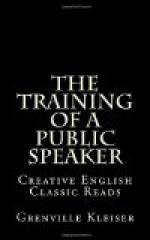Tho division may not always be necessary, yet when properly used it gives great light and beauty to a discourse. This it effects not only by adding more perspicuity to what is said, but also by refreshing the minds of the hearers by a view of each part circumscribed within its bounds; just so milestones ease in some measure the fatigue of travelers, it being a pleasure to know the extent of the labor they have undergone, and to know what remains encourages them to persevere, as a thing does not necessarily seem long when there is a certainty of coming to the end.
ESSENTIALS OF GOOD ARGUMENT
Every division, therefore, when it may be employed to advantage, ought to be first clear and intelligible, for what is worse than being obscure in a thing, the use of which is to guard against obscurity in other things? Second, it ought to be short, and not encumbered with any superfluous word, because we do not enter upon the subject matter, but only point it out.
If proofs be strong and cogent, they should be proposed and insisted on separately; if weak, it will be best to collect them into a body. In the first case, being persuasive by themselves, it would be improper to obscure them by the confusion of others: they should appear in their due light. In the second case, being naturally weak, they should be made to support each other. If, therefore, they are not greatly effective in point of quality, they may be in that of number, all of them having a tendency to prove the same thing; as, if one were accused of killing another for the sake of inheriting his fortune: “You did expect an inheritance, and it was something very considerable; you were poor, and your creditors troubled you more than ever; you also offended him who had appointed you his heir, and you know that he intended to alter his will.” These proofs taken separately are of little moment, and common; but collectively their shock is felt, not as a peal of thunder, but as a shower of hail.
The judge’s memory, however, is not always to be loaded with the arguments we may invent. They will create disgust, and beget distrust in him, as he can not think such arguments to be powerful enough which we ourselves do not think sufficient. But to go on arguing and proving, in the case of self-evident things, would be a piece of folly not unlike that of bringing a candle to light us when the sun is in its greatest splendor.
To these some add proofs which they call moral, drawn from the milder passions; and the most powerful, in the opinion of Aristotle, are such as arise from the person of him who speaks, if he be a man of real integrity. This is a primary consideration; and a secondary one, remote, indeed, yet following, will be the probable notion entertained of his irreproachable life.




